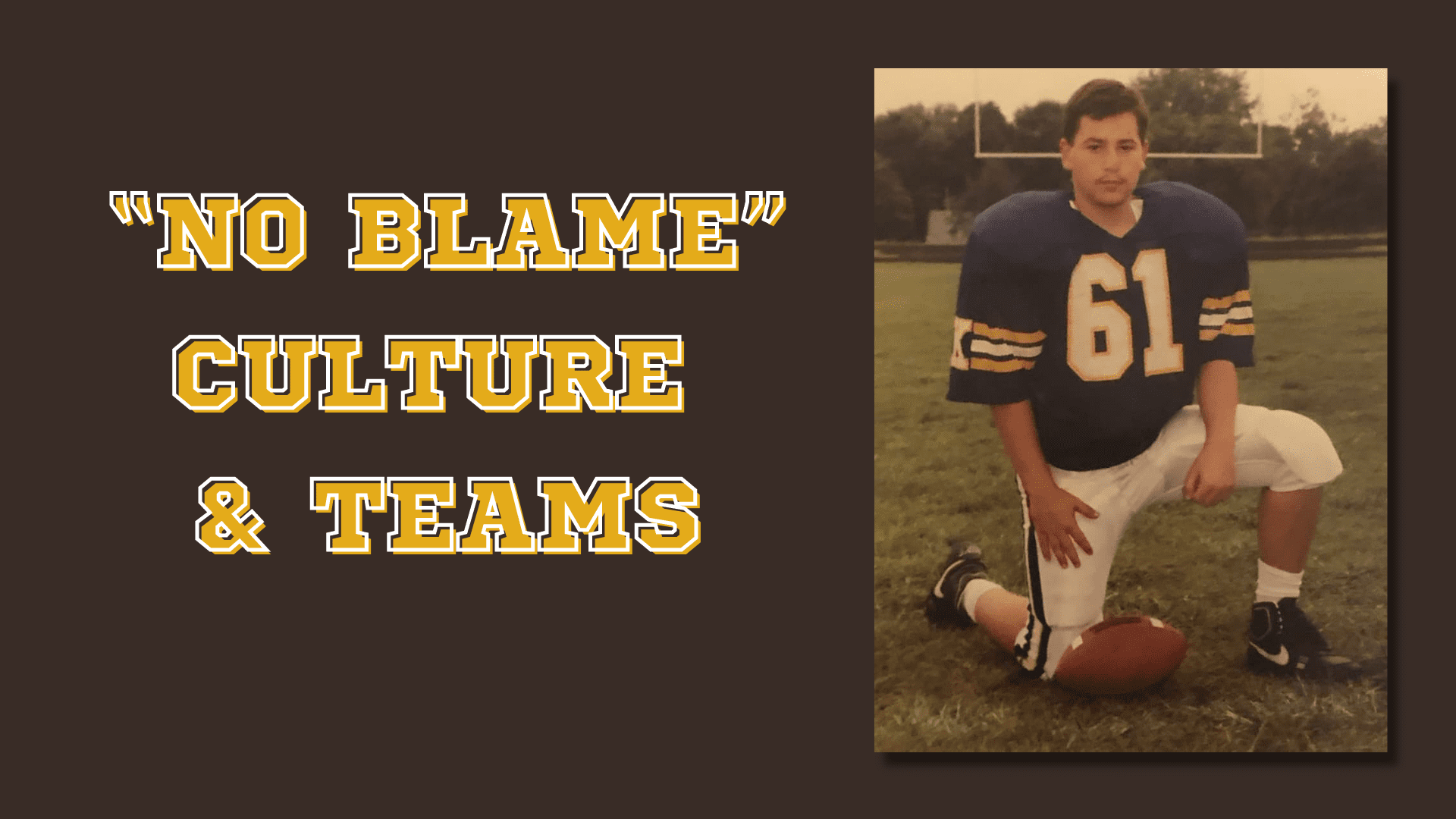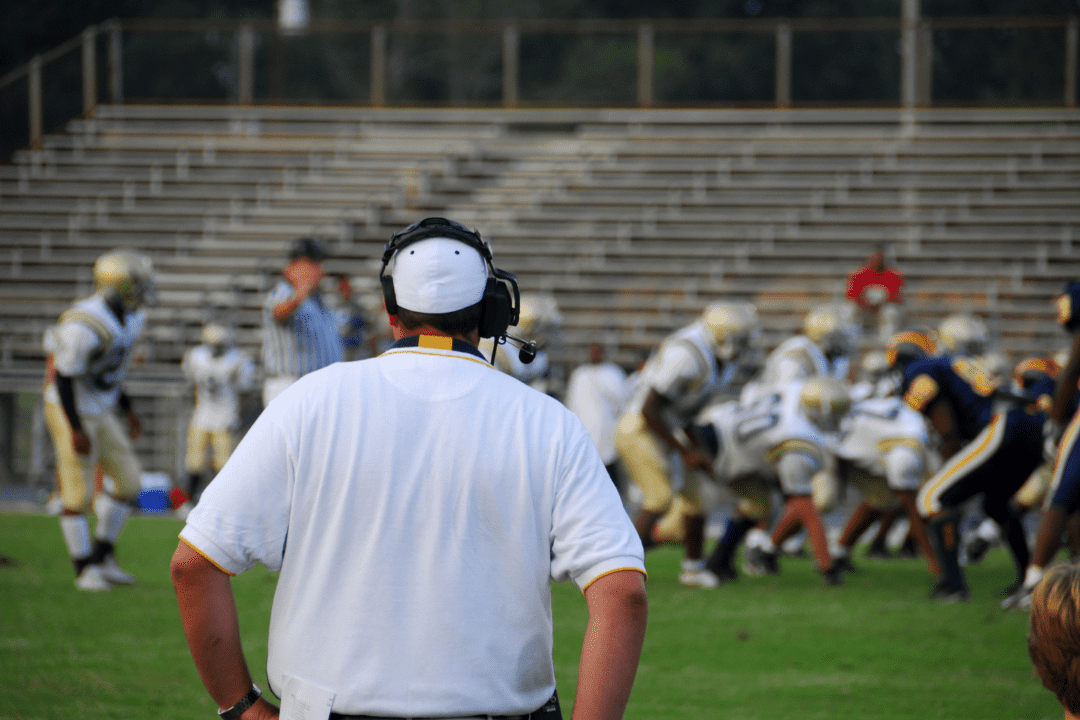“No Blame” Culture and Teams

Let’s talk about football a minute. People close to this “investigation” into my high school football days have wanted to hear the truth for 30 years. Despite my preference to stay silent, I have decided to share the truth now.
In Knoxville, Tennessee, the game of football, (you may know it as American football), is a big deal. Football players are valued by fans, parents, coaches, teachers and communities regardless if the team wins or loses. From little league through college and beyond, all of the games are attended. Individual glory or shame from a play can follow a player seemingly forever as individual plays are viewed, replayed and scrutinized. The pinnacle of that glory for the majority of football players is that they might put your jersey in a frame, and give it to you one day. That makes it all worth it. A jersey presentation is one of the greatest honors for a former player.
I was honored to recently attend one such jersey ceremony for a high school teammate, let’s call him Teammate 74. No, it was not my jersey being retired, but a teammates’ is the next best thing, right? The really cool part of it all is that this jersey presentation was for what Teammate 74 has accomplished since football, the person he grew up to be, how he has represented his alma matter since graduation, not for his on-the-field achievements.
This guy had to wear a different jersey number depending on whether the game was at home or away. That’s awful for a player. Your jersey number is your identity. Standing there watching the ceremony, my on-the-field memories of Teammate 74 began running through my mind. Surprisingly, despite all of the hits to the head, football players can have a great memory . . . or so we like to think.
Ask a former player what happened on a play 10, 20, or even 30 years ago in a high school football game, and that player will describe it in full and exact detail. Some of my former teammates and I can do just that with one specific and controversial 30-year-old junior varsity play from our definitely non-illustrious high school football career. Facts of this play have been disputed and argued since that fateful day.
If it was not bad enough that Teammate 74 was forced to wear multiple jersey numbers, he often bore the brunt of our coach’s frustrations. Anything that could possibly go wrong always did for our team, and when it did go wrong, Coach wanted to know who’s fault it was. Once the fault was assigned a full-out blow-up would follow, and a high school kid would be forced to face a reckoning of “instructional criticism.” “Council the operator to be more careful” doesn’t come anywhere close to what we would have to endure once we made it to the sideline after a screw-up, and poor Teammate 74 was the scapegoat more times than not. I would definitely call our football experience a blame-oriented environment.
What does a blame-oriented environment get you? Finger-pointing, lies and no fixes. Culture drives behavior so if the culture is that people are the problem the behavior will be:
- “I did not do it!”
- “No one saw me do it!”
- “You cannot prove I did it!”
- “If we could just get people to be careful and try harder, these problems would go away.”
Guess how many problems we fixed in that type of culture?

Let’s get back to the controversy. So there I was one game, playing left guard on offense. It is 3rd and short. My assignment on this particular play is to block a defensive tackle across from me. Teammate 74 is lined up to my immediate right as center. Teammate 74 snaps the ball to our quarterback, and I fire off and miss my block. Just completely whiff. The defensive tackle runs right between Teammate 74 and me, tackles our quarterback in our backfield forcing an end to our drive short of the first down.
I could hear Coach yelling from the sidelines before I even got up. “Who missed their block?! Who was it?!” When I got to Coach he asked me directly. What did I say? “Teammate 74 did it, Coach. He missed his block.” After 30 years of denial, I am finally admitting it. I told Coach it was Teammate 74’s fault when it was really mine, and I did it more than once. There. I said it. It was much safer to point a finger than to admit my mistake. Who would want to admit a mistake in that environment anyway? I was not going to learn anything in that situation, just get chewed out.
Blame culture still exists.
We can find it in companies and in investigations. When something goes wrong it is quick and easy to assign the blame. The problem with that is we do not fix anything. Mistakes are opportunities for improvement. Opportunities to coach, learn, grow, do better. People will make mistakes. Human beings can fail an infinite number of ways. We have to learn from these mistakes to prevent them from happening again and improve the operation. I wonder if our football team would have been more successful if we had investigated the problem, identified, and addressed the causes of the failure, as opposed to merely disciplining the team to handle to issue.
That is why you should use the TapRooT® System. Removing the blame focus and utilizing the human factors guidance in the system will lead you to understand the incident completely, identify the gaps in your system that allowed the mistakes to happen, what caused those gaps to exist, and what to do to fix them. If you are tired of having the same issues over and over again, you want to make the operation better, then you should attend the TapRooT® Root Cause Analysis course.



